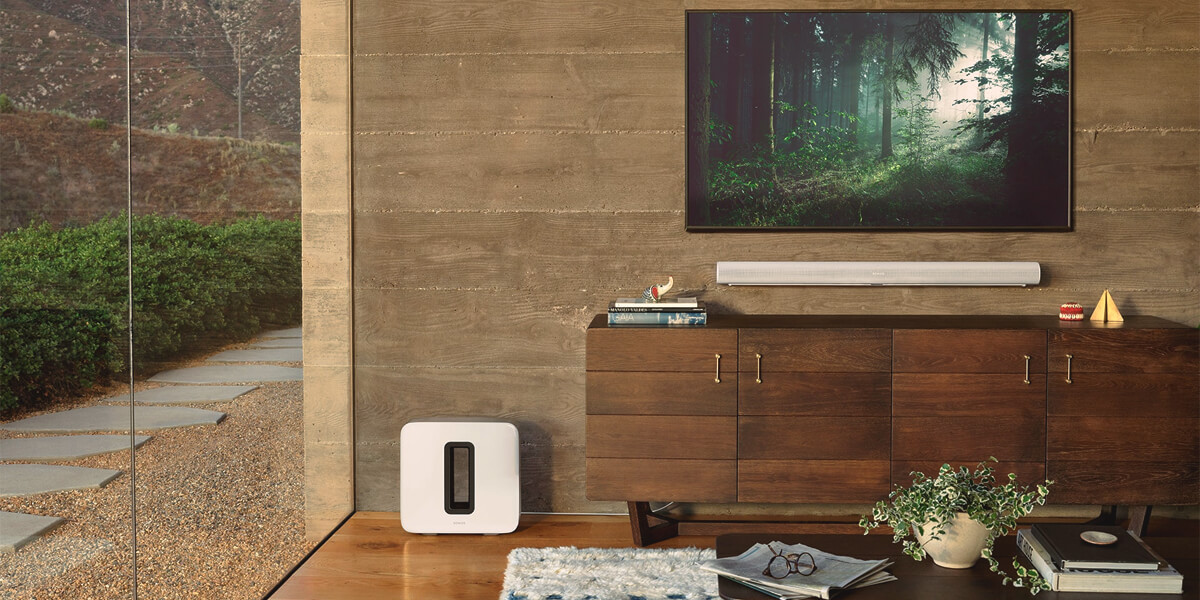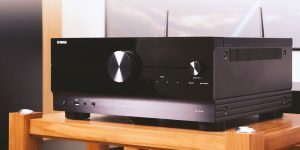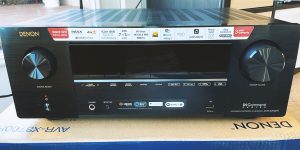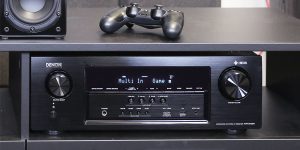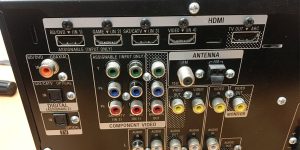When setting up a surround sound system, one of the most important decisions you’ll face is whether to go wired or wireless.
Selecting the right setup for your needs is of utmost importance, as it can determine the quality, flexibility, and convenience of your surround sound system. Both wired and wireless options have their own advantages and considerations that should be carefully evaluated.
In this comprehensive guide, I will delve into this topic and compare wireless vs. wired surround sound speakers. By understanding the importance of choosing the right configuration for your specific needs, you can make an informed decision and create an immersive environment that truly elevates your entertainment experiences.
Wired surround sound systems
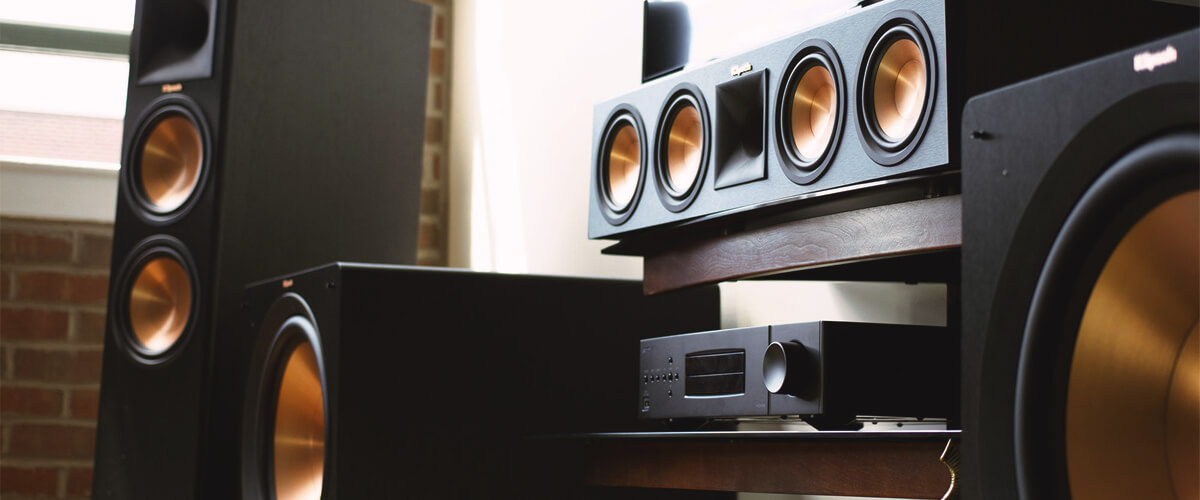
Let’s start with a wired surround speaker setup. I’ve prepared a list of the benefits of the surround sound system that you should take into account. Let’s look at this in more detail:
- Robust and uninterrupted connectivity. Unlike their wireless counterparts, wired setups ensure a stable and consistent signal transmission, minimizing the risk of interference or signal loss.
- Ability to deliver superior audio quality. The direct connection between the amplifier or receiver and the speakers allows high-fidelity audio reproduction, resulting in more accurate and immersive soundscapes.
- Extensive customization options. With individual cables running to each speaker, you have precise control over their placement and configuration.
To better understand the features and considerations of wired surround sound systems, let’s take a look at the following table outlining their pros and cons:
| Pros | Cons |
|---|---|
| Reliable and uninterrupted connectivity | Requires cable installations |
| Superior audio quality | Limited flexibility in speaker placement |
| Extensive customization options | Potential cable management challenges |
| Wide support for lossless audio formats | Higher upfront installation cost |
In summary, wired surround sound systems provide a solid foundation for an immersive audio experience. Their reliability, audio quality, and customization options make them an appealing choice for those who prioritize exceptional sound reproduction.
Wireless surround sound systems
In recent years, wireless surround speaker setup has gained significant popularity due to their convenience and flexibility. These systems offer a range of features that cater to the evolving needs of modern audio enthusiasts. Let’s delve into the benefits of a wireless surround speaker setup.
- Freedom from the constraints of cables. Gone are the days of tangled wires and complex installations. With wireless systems, you can place your speakers anywhere in the room without the limitations imposed by physical connections.
- Seamless integration with other devices. They often come equipped with advanced connectivity options such as Bluetooth, Wi-Fi, or proprietary wireless protocols, enabling easy pairing with smartphones, tablets, and other audio sources.
- Simplicity. Setting up a wireless system typically involves minimal hassle, as there is no need for cable management or complex routing.
To better understand the features and considerations of wireless surround sound systems, let’s take a look at the following table outlining their pros and cons:
| Pros | Cons |
|---|---|
| Convenient and flexible placement | Possibility of signal interference |
| Easy integration with other devices | Potential latency or audio quality issues |
| Quick and hassle-free installation | Limited support for lossless audio formats |
| Reduced cable clutter | Dependency on wireless connectivity |
In summary, wireless surround sound systems offer convenience, adaptability, and a modern audio experience without the limitations of cables.
Comparison of wired vs. wireless surround sound systems
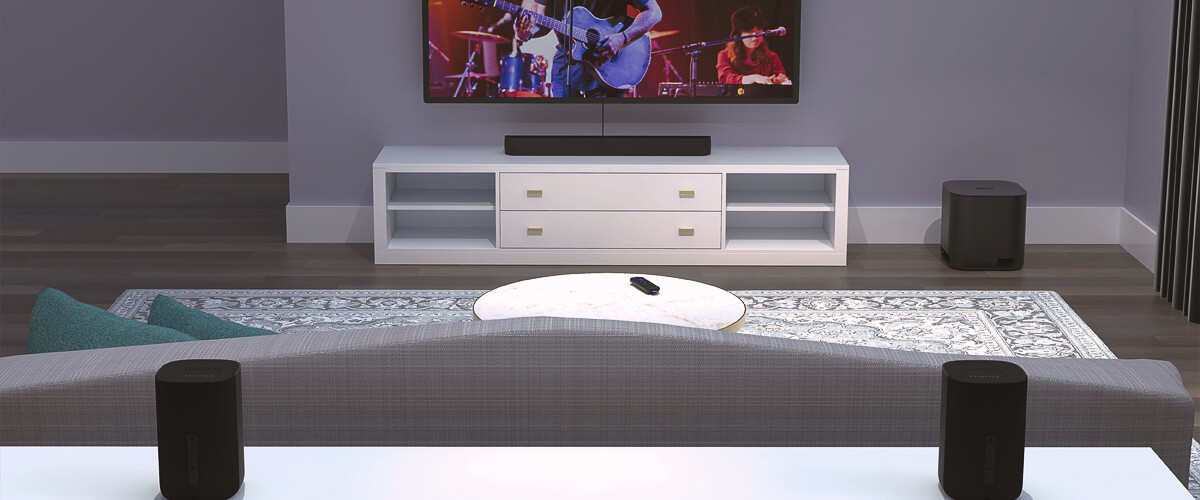
When deciding between wired and wireless surround sound systems, it’s essential to understand the differences and weigh their respective advantages and limitations. In this section, I will compare wired and wireless setups, examining various aspects to help you make an informed decision that aligns with your needs and preferences.
Audio quality comparison
The quality of the sound reproduction can greatly impact your overall listening experience, whether you’re enjoying movies or gaming. Here’s a table comparing wired and wireless surround sound systems based on audio quality:
| Audio quality | Wired surround sound systems | Wireless surround sound systems |
|---|---|---|
| Sound fidelity | Offer high-fidelity audio reproduction | It may not match the audio quality of wired systems |
| Bandwidth support | Can handle higher bandwidths | May have limitations on the supported bandwidth |
| Signal stability | Provide reliable and uninterrupted connectivity | There may still be occasional signal drops or instability |
| Surround sound performance | Allow for precise speaker placement and optimal sound dispersion | It may not provide the same level of precision as wired systems in speaker positioning |
Thus, wired systems excel in sound fidelity and performance, while wireless systems also offer good audio quality but may have limitations like potential compression or interference.
Installation and setup comparison
Installation and setup also play a crucial role in the decision-making process when it comes to selecting a surround sound system. So, I’ve prepared a table comparing wired and wireless surround sound systems based on installation and setup. Let’s look at it:
| Installation and setup | Wired surround sound systems | Wireless surround sound systems |
|---|---|---|
| Cable management | Requires cable routing and management for each speaker, potentially leading to a more complex installation | Minimal cable clutter and routing due to wireless connectivity and fewer physical connections |
| Ease of installation | Ease of installation cable installations, potentially involving drilling and hiding wires. | Quick and straightforward installation with minimal hassle and less physical labor |
| Flexibility | Limited flexibility in speaker placement due to cable length constraints and wiring requirements. | Provides greater flexibility in speaker placement and adaptability to room layout. |
| Scalability | It may require additional cables and adjustments when adding or repositioning speakers. | Allows for easy expansion without the need for extensive cable installations. |
| Compatibility | Compatible with a wide range of audio systems and devices. | Offers compatibility with various devices and audio sources, such as smartphones and tablets. |
So, wired systems require more extensive cable management, while wireless systems offer easier and clutter-free installation.
Price comparison
Price is a significant factor to consider when selecting a surround sound system, as it can greatly impact your budget and overall investment. The following table outlines the key aspects of the price comparison of these two systems:
| Price comparison | Wired surround sound systems | Wireless surround sound systems |
|---|---|---|
| Initial setup costs | It may require purchasing cables, connectors, and cable management solutions | Generally higher initial setup costs due to wireless technology and the potential need for wireless transmitter/receiver components |
| Additional expenses | Potential expenses for drilling holes, hiding cables, and professional installation services | Fewer additional expenses as there are no extensive cables or physical connections |
| Recurring costs | Typically none, unless cables need replacing or upgrading | Potential costs for batteries, maintenance, or wireless signal transmission devices, if required |
In summary, wired systems have lower initial setup costs, while wireless systems have higher upfront costs due to wireless technology.
Speaker placement flexibility comparison
To compare the speaker placement flexibility of wired and wireless surround sound systems, I’ve also prepared the following table. Let’s look at it:
| Speaker placement flexibility | Wired surround sound systems | Wireless surround sound systems |
|---|---|---|
| Range of speaker placement | Limited flexibility due to cable length and wiring requirements | Greater flexibility as speakers are not tethered by cables |
| Customization options | Offers precise control over speaker configurations and placement | Provides easy customization options with wireless connectivity |
| Adaptability to room layout | Requires planning and consideration during installation for cable routing and managing speaker positions | Highly adaptable to different room layouts. |
| Future room adjustments | It may require additional cable installations or adjustments when repositioning speakers due to the physical wiring. | Allows for effortless adjustments and room changes without the need for rewiring or complicated cable management |
Thus, wired systems have limited speaker placement flexibility, while wireless systems offer greater customization options without cable limitations.
Factors to consider when choosing a system
When choosing a surround sound system, several factors should be considered to ensure you make the right decision. Here are key factors to keep in mind:
- Audio quality: Wired connections generally provide better sound quality than wireless connections due to the potential for signal loss or interference in wireless transmission.
- Installation and setup: In terms of installation and setup, wireless systems offer greater flexibility and versatility. They eliminate the need for extensive cable management and allow for easier placement of speakers without the limitations of wired connections.
- Convenience: Wireless systems offer convenience and ease of use. They eliminate the need for physical connections and allow for seamless integration with mobile devices, streaming services, and other wireless audio sources.
- Range and coverage: Wired systems are not limited by signal range, ensuring consistent audio quality throughout the coverage area. Wireless systems, on the other hand, may have limitations in signal range, requiring careful consideration of the size and layout of the space.
- Expandability: Wired systems often provide more options for expandability, allowing for additional speakers and components to be added to the setup without the limitations of wireless technology.
- Cost: Wired systems generally have lower upfront costs since they do not require wireless technology. However, wireless systems may involve additional expenses for wireless speakers, transmitters, and receivers.
- Interference and signal dropout: Wireless systems may be prone to signal dropouts or interference from other wireless devices or obstacles in the environment. Wired systems offer a more stable and reliable connection.
- Aesthetics: Wireless systems can contribute to a cleaner and more visually appealing setup, as they eliminate the need for visible cables. Wired systems may require careful cable management to maintain a neat appearance.
When choosing between a wired and wireless sound system, consider these factors to ensure that you select the option that best aligns with your audio quality expectations, installation requirements, convenience needs, and budget constraints.
Thus, in this article, I have considered the possibilities of wired and wireless sound systems. Also, I compared them with each other according to different criteria. I hope this information will help you in choosing the best option.
FAQ
Can I mix wired and wireless speakers in a surround sound system?
Yes, it is possible to mix wired and wireless speakers in a surround sound system. Some systems offer the flexibility to incorporate both types of speakers, allowing you to enjoy the convenience of wireless speakers while maintaining the precision and stability of wired connections for certain speakers.
Do wireless systems have signal dropouts or interference issues?
Although wireless surround systems have improved over time, there is still a chance of signal dropouts or interference issues, especially in environments with significant wireless interference or long distances between transmitters and speakers.
Are there any security concerns with wireless speakers?
Actually, wireless speakers have potential security concerns, but reputable manufacturers implement encryption protocols and security features for secure communication.
